The Toronto Maple Leafs concluded the 1992-93 NHL season with 99 points and entered the playoffs as the third seed in the Norris Division, drawing the second seeded Detroit Red Wings in the first round of the playoffs. The series not only went the full seven games, but the final and deciding game in Detroit went to overtime before Toronto was able to advance to face the St. Louis Blues, who shocked the top seeded Chicago Blackhawks.
The scrappy Blues put up quite a fight, pushing the Maple Leafs to another Game 7 before Toronto was able to advance to the Campbell Conference Finals.
Meanwhile in the Smythe division, the Los Angeles Kings eliminated the favored Calgary Flames in six games before upsetting the top seeded Vancouver Canucks in six to earn a date with Toronto in one of the more memorable playoff series in league history.
The Maple Leafs, led by Doug Gilmour's 127 points, rugged captain Wendel Clark and the goaltending duo of rookie Felix Potvin and Grant Fuhr, were looking to play tight defensive hockey in hopes to return to the Stanley Cup Finals for the first time since winning the championship in 1967.
Meanwhile, the Kings, still looking to participate in their first finals in 1993, were led in scoring by Luc Robitaille's 63 goals and 125 points. Jari Kurri, Rob Blake and Wayne Gretzky also led the Kings attack. Gretzky had been limited to just 45 regular season games by a back injury and finished outside of the top three in league scoring for the first time in his career, but had fully recovered in time for the playoffs.
Kings coach Barry Melrose recalls the series "was one of the best series the NHL has had in the last 30 years. Both buildings were electric, and both cities were unbelievable."
Game 1 went to the Maple Leafs at home 4-1 but the tone for the series was set when the King's Marty McSorley destroyed Gilmour, who already had three points, with an elbow to the head and Clark went after McSorley in the kind of fight rarely seen in the playoffs.
The incident began a war of words in the media between Maple Leafs coach Pat Burns and the Kings Melrose after Burns accused Melrose of ordering the hit on Gilmour during the game, which got personal with Melrose commenting on Burns' weight and Burns comparing Melrose's mullet to that of country singer Billy Ray Cyrus.
The Kings were able to gain a split on the road with a 3-2 win and back in Los Angeles, they held serve in Game 3 with a 4-2 win only to lose two days later by the same score, sending the series back to Canada tied at 2-2.
In a tense Game 5, Toronto was able to put Los Angeles on the brink with a 3-2 win with 40 seconds remaining in overtime when Glenn Anderson scored by knocking a puck out of the air with an amazing backhanded swing.
Game 6 began with the Kings dominating the first two periods and holding a 4-1 lead in the third period before Clark exploded with a hat trick to force the game into overtime with under a minute and a half remaining in regulation.
Famously, a high sticking incident by Gretzky on Gilmour went uncalled and Robitaille fed the puck to Gretzky to win the game just 1:41 into overtime to force a deciding seventh game back at the historic Maple Leaf Gardens on this date in 1993.
Game 7 began with Grezky scoring shorthanded to put the Kings up 1-0 before assisting on Tomas Sandstrom's goal to give the Kings a 2-0 lead after one.
Clark and Anderson got the Maple Leafs even with goals in the first half of the second period before Gretzky struck again to beat Potvin with a slap shot to give the Kings a 3-2 lead heading in to the third.
Clark responded early in the third to even the game again at 3-3. Play continued up and down the ice until Mike Donnelly scored on a rebound of an Alexi Zhitnik shot to give the Kings the lead with less than four minutes remaining. Gretzky then completed his hat trick seconds later after circling the net and sending a backhander off the skate of a defender to give the Kings a two goal lead and little time remaining.
Before the Kings could breathe easy, Dave Ellett got one back for the Maple Leafs but when the dust settled, Toronto area native Gretzky had dismayed the home fans by setting a Stanley Cup record with his eight career playoff hat trick as the Kings prevailed 5-4 to advance to the Stanley Cup Finals for the first time in franchise history.
Today's featured jersey is a 1992-93 Los Angeles Kings Wayne Gretzky jersey. With the infamous trade of Gretzky to the Kings, a new era began for hockey in Los Angeles, which included the team's jerseys. Out was the garish gold and purple the team had worn since their inception in 1967 and in was a new black and white color scheme, popularized by the Los Angeles Raiders of the NFL.
While the jerseys did not change during their 10 year run, the customization of the Kings new jerseys evolved over time. The white jerseys originally had two color names and numbers in silver outlined in black for three seasons, followed by a change to three colors, silver trimmed in white and outlined in black for 1991-92.
For the 1992-93 season the numbers finally changed to a much easier to read black, which was trimmed in white and outlined in silver. Meanwhile, the hard to read three color names were simplified to one color black for the remainder of the jersey's run.
All players wore the Stanley Cup Centennial patch on their jerseys in 1992-93, including the first three rounds of the playoffs. Once the two finalists were determined, the Kings and Canadiens then changed to the Stanley Cup Finals patch rather than the season long Centennial patch of today's featured jersey.
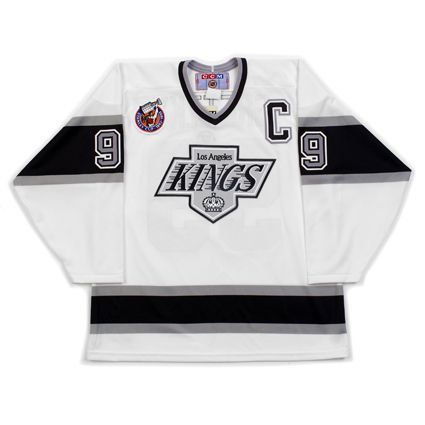
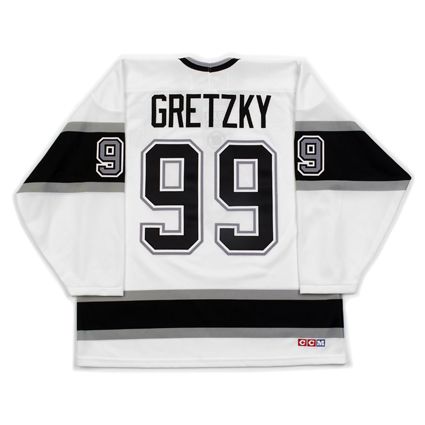
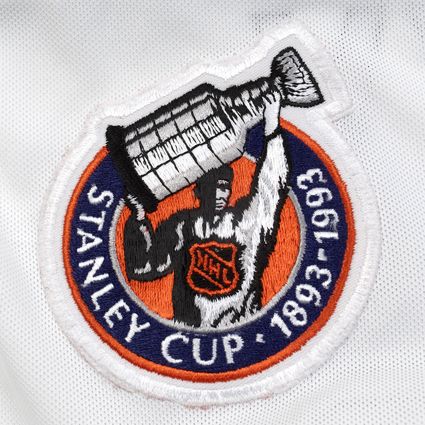
Bonus jersey: Today's bonus jersey is a
1992-93 Toronto Maple Leafs Doug Gilmour jersey as worn during the Maple Leafs memorable playoff series against the Kings.
Following the well received Turn Back the Clock jersey worn by Toronto for select games during the previous season of 1991-92 in honor of the NHL's 75th Anniversary, the Maple Leafs debuted a brand new jersey for the 1992-93 season, which featured a much more simple and classic style.
The twin white stripes on the arms and waist were first used by Toronto in 1934-35 and remained in use all the way through 1966-67. That basic jersey was paired with the Maple Leafs current, modern logo as well as the Turn Back the Clock jersey's retro style leaf logo as the new secondary shoulder logo.
First up is a look at Game 1, which immediately set the tone for the series and the drama that was to follow.
Here is Don Cherry reacting to the non-call on Gretzky in overtime of Game 6, followed by NHL official Bryan Lewis to explain the call.
Finally, a brief look back at the entire series.




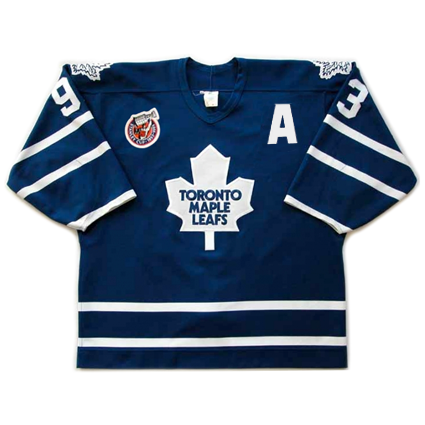
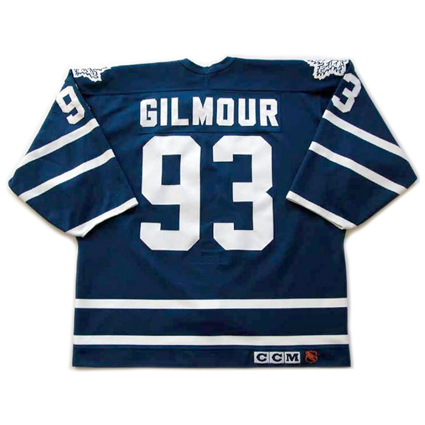










No comments:
Post a Comment
We welcome and encourage genuine comments and corrections from our readers. Please no spam. It will not be approved and never seen.